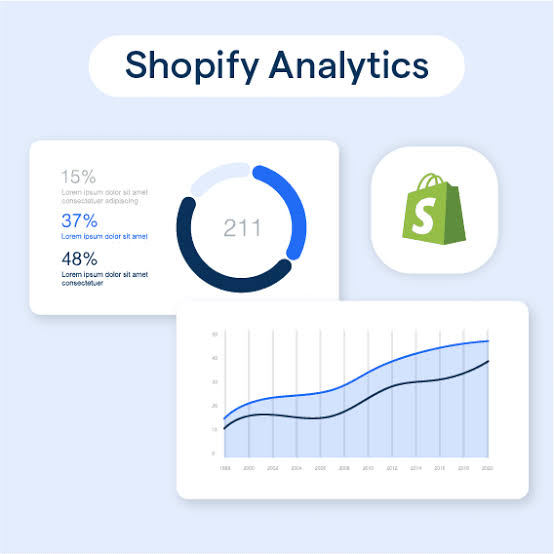Discover how Shopify analytics can enhance your e-commerce strategy by providing key insights into sales, customer behavior, and website traffic. Learn how to leverage these data-driven tools to optimize marketing efforts, improve customer experiences, and boost overall store performance.
In rapidly evolving world of e-commerce data has become critical asset for businesses seeking to thrive and grow. Shopify, leading e-commerce platform offers comprehensive analytics suite. This suite is designed to help merchants leverage data for making informed decisions. Shopify analytics plays pivotal role in data-driven decision making. It provides valuable insights into various aspects of online store performance.
This article explores significance of Shopify analytics. It examines how it can be used to drive business decisions. It also discusses benefits it offers to e-commerce businesses.
Understanding Shopify Analytics
Shopify analytics refers to suite of tools and reports provided by Shopify that allow merchants to track and analyze performance of their online stores. These tools collect data on various metrics. This includes sales customer behavior and website traffic. They present information in user-friendly format. By utilizing these analytics, merchants can gain deeper understanding of their business operations. They can also learn about customer preferences and market trends
Key Components of Shopify Analytics
Shopify offers several key components within its analytics suite that contribute to effective data-driven decision making
1. Dashboard: Shopify dashboard provides overview of essential metrics such as total sales, order count and customer activity. It offers snapshot of store’s performance. This helps merchants quickly identify significant changes or trends
2. Reports: Shopify generates detailed reports on various aspects of store performance including sales, customer behavior and inventory. These reports offer insights into which products are performing well which marketing campaigns are driving traffic and how customer interactions are evolving
3. Customer Insights: Shopify analytics provides data on customer demographics, purchase behavior and engagement. By understanding who customers are and how they interact with store merchants can tailor their marketing strategies and product offerings to better meet their needs
4. Sales Performance: Analyzing sales data helps merchants understand revenue trends. It also aids in identifying best-selling products and evaluating effectiveness of pricing strategies. This information is crucial for optimizing inventory management and maximizing profitability.
5. Traffic Sources: Shopify tracks sources of website traffic including organic search, social media and paid advertising. This data helps merchants assess effectiveness of their marketing efforts. They can then allocate resources to most productive channels.
Leveraging Shopify Analytics for Data-Driven Decisions
To fully harness power of Shopify analytics merchants should focus on several key areas:
1. Optimizing Marketing Campaigns: By analyzing traffic sources and conversion rates, merchants can evaluate effectiveness of different marketing channels. This information allows them to allocate marketing budget more effectively targeting channels that yield highest return on investment.
2. Improving Customer Experience: Customer insights from Shopify analytics provide valuable information about purchasing behavior and preferences. Merchants can use this data to personalize shopping experience. They can also improve product recommendations and enhance customer satisfaction
3. Enhancing Product Offerings: Sales performance data helps merchants identify top-selling products and trends in customer preferences. By analyzing this information merchants can make data-driven decisions. This affects product development, inventory management and pricing strategies
4. Streamlining Operations: Shopify analytics helps merchants monitor key operational metrics like order fulfillment times and inventory levels. By identifying areas for improvement merchants can streamline operations. They can reduce costs and improve efficiency
5. Forecasting and Planning: Historical data provided by Shopify analytics can be used to forecast future sales trends. Merchants can plan for seasonal fluctuations. This proactive approach allows them to prepare for changes in demand. They can optimize inventory and staffing levels accordingly
Benefits of Shopify Analytics
Utilizing Shopify analytics offers several benefits for e-commerce businesses
1. Informed Decision Making: Access to comprehensive data and insights enables merchants to make informed decisions based on real-time information. This is better than relying on intuition or guesswork
2. Enhanced Performance Tracking: Shopify analytics provides tools for tracking and measuring performance of various aspects of online store. This allows merchants to identify areas of success and areas needing improvement
3. Increased Efficiency: By leveraging data to optimize marketing campaigns product offerings and operational processes, merchants can improve overall efficiency. This ultimately drives better business outcomes
4. Competitive Advantage: Data-driven decision making gives merchants competitive edge. It allows them to respond quickly to market trends and customer preferences. This ultimately enhances ability to compete in crowded marketplace
5. Customer Retention: Understanding customer behavior and preferences through Shopify analytics helps merchants create more personalized experiences. This leads to higher customer satisfaction and retention
Challenges and Considerations
While Shopify analytics provides valuable insights there are some challenges to consider
1. Data Overload: With vast amount of data available, merchants may experience information overload. Important to focus on key metrics that align with business goals. It is necessary to avoid getting bogged down by irrelevant details
2. Data Accuracy: Ensuring accuracy of data collected is crucial for making reliable decisions. Merchants should regularly review and validate data. This helps avoid making decisions based on incorrect or incomplete information
3. Interpreting Data: Analyzing and interpreting data can be complex. This is especially true for those without a background in data analysis. Merchants may need to invest in training or seek professional assistance to fully leverage Shopify analytics
In conclusion Shopify analytics plays crucial role in data-driven decision making for e-commerce businesses. By providing valuable insights into sales performance and customer behavior, Shopify analytics helps merchants optimize marketing strategies. It enhances customer experience and improves overall business performance. Embracing power of data allows merchants to make informed decisions. It also streamlines operations and helps them stay competitive in ever-changing e-commerce landscape
